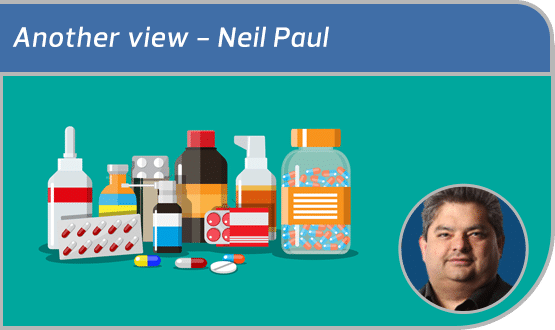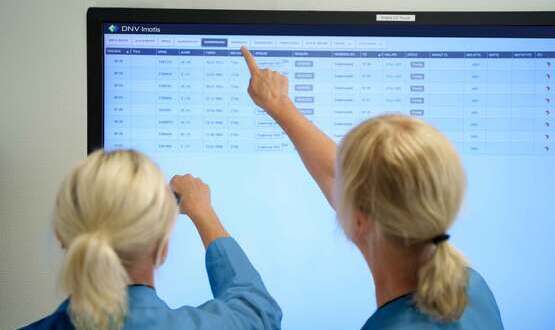Another view: of smart devices for medicines
- 13 March 2018

When our GP columnist Neil Paul turns his mind to NHS finances, his attention quickly turns to medicines and the cash wasted by people just not taking them. Could a smart device make a difference?
NHS finances are a hot potato. While no-one is going to turn down more money, I do believe there is still a lot of waste we could eliminate and productivity gains we could make.
And one of the biggest areas in which we could do it is, I think, medicines. I think we could do with some disruptive innovation here and, yes, you’ve guessed it – I’ve got an idea. Why don’t we create smart devices to help people take their medications reliably?
The long term costs of non-compliance
The reality is that taking tablets regularly is tricky. Once a day is hard, taking 14 a day all at different times must be a nightmare. I have always felt that there is an argument for switching people to once day versions – which, while more expensive, should improve compliance. Others postulate the concept of the polypill, a tablet combining multiple medications in one. This is expensive, and yet there is a lot of evidence that poor compliance leads to long term complications – and much greater expense.
Currently one option to aid compliance is dosing boxes. These are effectively Tupperware containers that have little sections for each day of the week and different times of the day. The drugs to be taken at that time are in the boxes and in theory you can tell what’s been taken by which are empty. I suspect they are the bane of pharmacists’ lives, as they must spend hours making them up.
Think outside the box
The problem is while these boxes are OK for someone on long term regular medication, it can be hard when you want to change someone’s medication. You either need to start cutting open the boxes and fiddling with them or take them all back to the chemist, which can take days to sort. Also while the boxes tell you which pills are to be taken when, they don’t remind you to do it. If you don’t open a section, who will know you haven’t taken the tablets within it?
What I think we need is a pill dispensing robot that takes standard sized cartridges of pills. All medications should be available in these cartridges. They would have some sort of barcode stating what was in them and the expiry date.
The machine could come in different sizes for three, five or 10 medications, or perhaps would need some way of adding more cartridges. I feel a design competition coming on!
Smart dispensing and smart monitoring
I’m imagining something the size of a bread maker or laser printer, tabletop and plugged into the wall with an internet connection. It might alarm at certain times of the day or speak to your phone/smart watch to say medicines are due. When you arrive at the machine and press dispense, it will deliver the tablets you need at that time.
It would track compliance because it would know if when you hadn’t pressed the button, keeping a record of this and reporting back. When the cartridge gets low it would automatically order more via the internet.
Dose changes would also be easy via a link to the Spine or GP record. Double the dose of a drug and it gives you two tablets. Stop one and it immediately stops dispensing them. Add a new drug and the cartridge arrives.
Vital signs too
A good machine might cope with more than one person – husband and wife. Could you even have trolley-based machines for nursing homes? Most residents will be on the same few medications.
Perhaps the machine might ask the person how they are feeling when it dispenses medication. Prompt the person to do a blood pressure, take their temperature, measure their weight, do a blood glucose.
It could speak to sensors on these other devices via Bluetooth or just a USB cable. It could become a central home-based vital signs monitor. Maybe it wouldn’t dispense the meds if the person didn’t stand on the weighing scales or do a peak flow, or maybe it would vary the dose based on readings? A nursing home model might log all vitals into a central EPR and be linked direct to the medication record, reducing the need for transcriptions which can introduce errors.
The machine sounds expensive, but the idea is to reduce waste massively, make better use of pharmacist resources, improve compliance and collect better data. It could pay for itself.
Sensing potential
OK, there would be the question of whether the patient actually swallowed the tablet. There are anecdotes of people ordering regular medications but leaving them unopened in a cupboard, as they didn’t want the doctor to think they weren’t taking them.
Perhaps having to go to the machine three to four times a day and press a button is too much hassle to do only not to take the medicines? Perhaps it becomes easier to say I’m not taking them? However, I guess with a camera perhaps it could video a person swallowing?
Perhaps we need some sort of belt sensor that goes round the neck or chest and detects when a pill is swallowed? This might not be as daft as it sounds, as I’m becoming intrigued by the concept of smart devices.
Why aren’t we doing it?
What about smart syringes or some form of device that might count how many times a syringe was used, and how much of the drug was given? I’ve come across the concept of smart needles that measure the resistance against injection. In diabetes in particular there is evidence if you keep injecting one spot it means the insulin isn’t absorbed properly (the resistance to injection goes up) and it either doesn’t work as well or you need more which costs money.
And if you Google smart inhalers, there are all sorts of devices available in other countries. AZ who are based up the road from me appear to have all sorts of devices available in the US but none that I’ve seen here. Yet there is huge potential.
There are so many roles smart devices could play; so many concepts we could dream up. So I’m not quite sure why we aren’t doing it.





6 Comments
Dr Paul – I love the vision and completely agree. However I think we need to lookout the patient more holistically and not as a pill consumer. I’m a pharmacist (hospital though) and all for decreasing tablet burden, but for patients, surely medicines aren’t to be entrenched in routine, but to be the liberator? It’s the salbutamol that let’s me walk to the shops, or the gabapentin that means I can enjoy a friend’s barbecue. My point is that medicines are there to enable people to live more enriching live, they’re not to “be” the patient’s life! The issue I have with the dispenser isn’t technological (I live that part and as a health tech entrepreneur I’ve had similar ideas in the past); it’s more..what about when people go out? Can you program the Pill Pod and it can dispense “to take away” pods? Can you tell the Pill Pod, how long you’re going on holiday for and it can dispense you X number of punches? If it automatically reorders, does it sync with your calendar to know when you’re out so you don’t get pharmacy staff rocking up with new cartridges and you’re busy having a blast in town because great adherence means you can walk to the cafe now? I think the tech is simple really, and it’s there: Wifi; GPS; APIs (GP & Pharmacy systems)…but to really complete the loop for patients…you’re looking at a considerable £m. I wouldn’t even bother about selling to the NHS or CCGs. I’d launch it abroad, and then introduce it locally in London for example (everything starts in London really). The NHS is a sucker for only really buying off the shelf products when they’re proven elsewhere and thus come at a premium
i guess i was thinking about all the house bound patients I see on 20-30 tablets a day and how much of a nightmare it must be. Interestingly friends who are on regular meds tell me even once a day its hard to remember to take them perhaps something by the toaster and kettle? love the idea of it dispensing a packed lunch of pills for you to take perhaps prompted by your smart phone!
” I suspect they are the bane of pharmacists’ lives, as they must spend hours making them up”
Many love the dosette type containers as they persuade practices to prescribe their contents weekly, and quadruple their dispensing fees.
I’m sure the company likes the fees.. do the pharmacists like the work? 🙂 I guess im suggesting the company could redeploy the pharmacists to perhaps being paid for doing chronic disease management? or minor ailments?
its been mentioned to me that containers revolutionised shipping and pallets revolutionised trucking – perhaps we need a standard for pills?
Inertia, habits and the higher-cost of these devices? Somebody with access to the figures needs to find a business-case. Will any such device save a CCG money? All the patient costs need to be linked-up, from the cost of the device (more) to the downstream costs of patient treatment (how much less?) – not a process that is followed by purchasing professionals a much of it is out of their domain.
Personally, I would love to develop such devices (having a past-life as an engineer) and I think the pill-dispenser could be much smaller than a bread-maker! – and the sales slogan? “it dispenses with accuracy”>
Comments are closed.